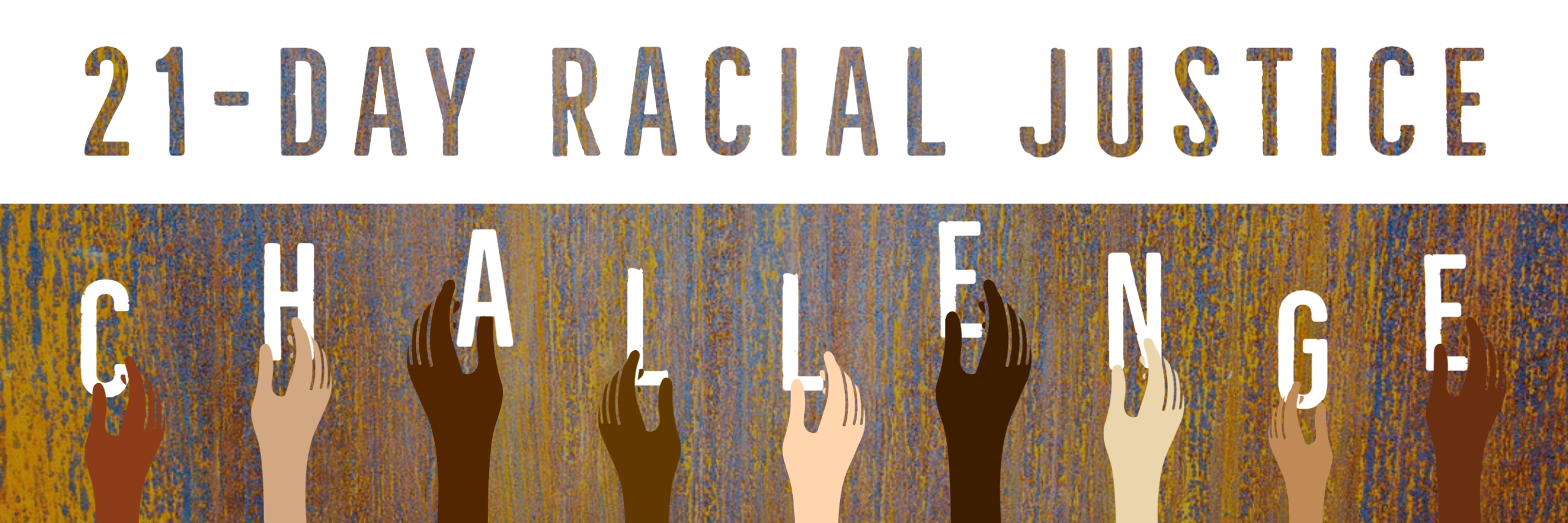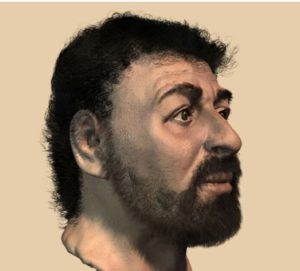
The murder of George Floyd has proven to be a watershed moment for racial justice in our country and beyond. Many of you have reached out to the church asking what we can do to address issues of race and racism.
In response to our shared desire to love God with all our heart, mind, and strength, and to love our neighbor as ourselves, a team of church members has curated a list of resources for our church family in the form of a 21-Day Racial Justice Challenge. Each day you will have an opportunity to watch a short video, or read an article or excerpt that explores how racism may continue to play out in our society and in our own thoughts and practices. Read/watch what you can. Save what you can’t for later. As you interact with these resources, we encourage you to discuss them with friends and family.
We are joining with other churches that are predominately white in this effort. The aim is to be patient and open in listening to voices primarily of people of color. You might disagree with something expressed in one or more of the presentations. That is OK. As we seek to grow our understanding of the challenge before us, we are mindful that God can speak to us even through disagreement.
We have compiled some spiritual practices so you can invite God into the conversation (click the button below to view the document). Opportunities for members to join in a Zoom small group to further reflect, discuss, and consider steps forward will be available during the month of August. Scroll down for more details in the “Now What?” section, or click to register for Zoom small groups by August 2, 2020.
If you haven’t yet watched Senior Pastor Dr. George Anderson’s conversation with Dr. William Lee, retired Senior Pastor of Loudon Avenue Christian Church of Roanoke, begin your challenge here: https://youtu.be/czuAvOtruKA?t=314 (1 hr. 9 min. Conversation begins at 5:20.)
Grace and peace to you.
The 2PC Racial Justice Challenge Planning Team

- Watch: How did we get here? In this video (4 min.) Bryan Stevenson, founder of the Equal Justice Initiative and author of Just Mercy, explains how we arrived at this moment and where we might be headed.
- We encourage you to try one of the spiritual practices (found above) today.
- Watch James Baldwin’s response to Paul Weiss, Sterling Professor of Philosophy, Yale University, The Dick Cavett Show (June 13, 1968). Weiss had said Baldwin should look for ways in which Blacks and Whites are connected, rather than focus on the Black experience. (3 min. 30 sec.)
- Reflect and pray on “Bryan Stevenson on the Frustrations Behind the George Floyd Protests” – Interview by Isaac Chotiner, The New Yorker (June 1, 2020).
- Which of the following two representations of Jesus would you choose to hang in your home or display prominently at Second Presbyterian Church?

Model of a Galilean Man by Richard Neave, 2001

Head of Christ by Warner Sallman, 1940
- In 2001, forensic anthropologist Richard Neave created a model of a Galilean man for the BBC documentary, Son of God. He created it on the basis of an actual skull found in the region. He did not claim it was Jesus’s face. It was simply meant to prompt people to consider Jesus as being a man of his time and place, since we are never told he looked distinctive.
2. Watch: “How Jesus Became Widely Accepted as Being White.” (11 min.)
White Privilege Unpacked
- Read the 1989 essay, “White Privilege: Unpacking the Invisible Knapsack,” by Peggy McIntosh.
- Listen to “A Conversation with a Police Union Leader” from the podcast, “The Daily.”
- Read Martin Luther King’s response that became known as the Letter from Birmingham Jail.
- Watch: Video of Charlottesville residents talking candidly about racism two years after the deadly 2017 “Unite the Right rally.” (18 min.)
How To Be Anti-racist
1. Reflect on the following passages from How to Be an Antiracist by Ibram X. Kendi.
- “Racist: One who is supporting a racist policy through their actions or inaction or expressing a racist idea” (p.13).
- “Antiracist: One who is supporting an antiracist policy through their actions or expressing an antiracist idea” (p.13).
- “Racism is a marriage of racist policies and racist ideas that produces and normalizes racial inequities” (p.17).
- “A racist policy is any measure that produces or sustains racial inequity between racial groups” (p.17).
- “There is no such thing as a nonracist or race-neutral policy. Every policy in every institution in every community in every nation is producing or sustaining either racial inequity or equity between racial groups” (p.17).
- “To be an antiracist is a radical choice in the face of this history, requiring a radical reorientation of our consciousness” (p.22).
2. Watch: “Why ‘I’m not racist’ is only half the story.” (7 min.)
Speaking with Children About Racism
Children experience and are taught stereotypes based on race and gender every day.
Ex: African Americans are better athletes; Girls are better students; White men are better leaders.
Adults often avoid discussing race and gender with children. Don’t shy away from these conversations. You don’t have to have the answers. Wondering alongside a child is a beautiful gift.
Read: “Beyond the Golden Rule: A Parent’s Guide to Preventing and Responding to Prejudice” by Dana Williams.
Ask the children in your life:
- Have you heard the word racism?
- What does it mean to you?
- Do you believe everyone is created equally?
- Do you know our nation has not treated people equally in the past?
- Do you know that still happens today?
- What might we be able to do about this?
- Read: “Six Steps to Speak Up,” Teaching Tolerance (accessed June 19, 2020)
- Read: “Speak Up: Responding to Everyday Bigotry,” Southern Poverty Law Center (January 26, 2015)
- Read: “How to talk to your non-black family members about race, according to therapists,” Julia Naftulin, Insider (June 5, 2020)
Bias in Healthcare
Implicit bias refers to learned stereotypes and prejudices that operate automatically and unconsciously, while structural racism takes into account the many ways societies foster racial discrimination through housing, education, employment, media, health care, criminal justice, and other systems.
Recent studies reflect that our National history of structural racism has a direct impact on the health of Americans, and how they receive healthcare treatment.
Bias in Healthcare, pt. 2
Reflection by Church Elder Lauren Ellerman.
When I moved to Roanoke around 15 years ago, I asked new friends and colleagues for their recommendations. Which dry-cleaner was best? Which OBGYN? I sought advice on which Farmer’s Market had the most local produce, and which church should we attend and investigate.
I ended up getting an appointment with a well-respected OBGYN. I liked him. He was personable, kind, and thorough. After my second annual exam he asked me to step into his office after the appointment. He asked me pointedly when I planned to have a family and shared a story from that morning that had upset him. He had received a call from the hospital, a patient had arrived in the Emergency Department demanding to be seen by an OBGYN and be delivered that day. He inferred to me the patient was poor, uninsured, and a minority. He also inferred she was unmarried, had multiple children, and as he said, an attitude. “People like you need to be having children. Not like her,” he stated unequivocally.
Even in that moment, sitting across from his white robe and wall of degrees, I realized what he was saying.
The value of my future child’s life mattered more than the life of the child he was being asked to deliver.
If that is how we see each other, as more and less deserving, as more or less wanted, as more or less valued – how can the care we provide be equal? How can the provision of professional services be uniform? How can the healthcare being rendered be free from bias, prejudice and harm?
It isn’t. In 2016 the CDC conducted a five–year study on maternal death in America and found African American and Native American women were 3 times more likely to die during or after childbirth, than White women. That unmarried women were more likely to die, than married women.
Do we see that young unmarried African American woman as a mother? Or a nuisance.
Do we see her child as a blessing, or a problem?
Do we see her family as children of God? I sure hope so.
Read:
Bias in Healthcare, pt. 3
Reflection by Church Elder Lauren Ellerman.
Part of my job is to take cold calls from the general public experiencing a healthcare emergency or trauma, and help them navigate through trying to get better care, or answers as to why the medical care they received was insufficient.
People call during dark, difficult and raw moments. I am a stranger and yet, I often hear honest reflections and confessions from people across the Valley.
On almost a weekly basis, I hear a person in need, utter something like the following:
“I don’t want a foreign doctor – but that’s all we got.”
“I have a feeling, if I hadn’t been a Medicaid patient… I would have gotten better care.”
“I have a feeling, the reason the doctor didn’t take my complaints seriously, was that I am black.”
“I believe if I lived in South Roanoke, my mother would have gotten the care she deserved, and the doctor would have come and seen her.”
It is normal to look for a reason a bad outcome occurred. It is normal to question why you feel your concerns were dismissed. And sadly, in America, bad outcomes and distrust with health care professionals and patients is often based on race, and most directly, racism.
And it seems, as reflected in the two attached op-eds by healthcare providers, the racism we experience in the provision of healthcare is a two-way street.
Read:
- Read: “I know how painful racism is. But we can’t give up on voting,” Antonio Delgado, The Washington Post (June 2, 2020)
- Read: “How to be an effective ally in the fight against racism,” Kristina Davis, The San Diego Union-Tribune (June 13, 2020)
Racism and Gun Violence
- Read: “Gun Violence and the Minority Experience,” Yolanda T. Mitchell, Ph.D., and Tiffany L Bromfield, M.A., National Council on Family Relations (January 10, 2019)
Racism and Gun Violence, pt. 2
- Read: “What Gun Violence Prevention Looks Like When It Focuses on the Communities Hurt the Most,” Elizabeth VanBrocklin, The Trace (July 10, 2019)
- Local Focus:
- The 1893 Lynching which occurred one block from our church. Watch Good Friday Spiritual Pilgrimage. (24 min).
- Yancey, Dwayne. “And the Harvest of Blood Commenced.” The Roanoke Times, September 20, 1993.
- Local Focus: Black Roanoke History
- https://www.roanokeva.gov/DocumentCenter/View/1537/Black-Roanoke-Our-Story?bidId=
The Cost of Urban Renewal in Roanoke
Summary: Mindy Fullilove, a Columbia University professor of psychiatry and public health wrote Root Shock, a 2004 book that examined the effects of urban renewal in Roanoke and other American cities.
Urban renewal was sold as a policy to improve minority neighborhoods. That was the original sin. In reality, it was “black removal” from the core of American cities for the purpose of economic development.
Fullilove writes “the reality of urban renewal was that cities wanted to improve their tax base. And what happened in Roanoke was neighborhoods were torn down so that commercial developers could develop properties and sell it to private interests. The city won because it increased the tax base, and the private developers won because this (process) was very lucrative. The only people who lost were the people who were promised a better quality of life.”
What happened in Roanoke occurred all over the country: black neighborhoods were destroyed under the guise of improving community quality of life so municipalities could enhance economic development and fatten tax bases. Moreover, most residents in Roanoke were not paid fair market value for their property as mandated by law.
All told, blacks in Roanoke and elsewhere were (1) lied to by government bureaucrats concerning the goals of urban renewal, (2) not given fair compensation for property taken through eminent domain, and (3) helpless to do anything about unlawful government behavior.

For Further Study and Reflection
1. Whether you have completed the 21-Day Racial Justice Challenge or not, we invite you to further digest what you have read, watched, and listened to by joining a facilitator led Zoom small group. Small groups will meet for one hour once a week for four weeks. During the first three weeks, discussion will focus on the 21-Day Racial Justice Challenge content. The final week will center on discerning how God might be calling us as individuals and as a community to further engage in acts of justice, mercy, and love. Groups will run from the weeks of August 9 to September 6, 2020. If you would like to join a Zoom small group to further discern the ways God might be calling us to the work of justice, click the button below to register by Sunday, August 2.
2. Engage with this 5-part module on Howard Thurman, often regarded as the spiritual founder of the Civil Rights movement.
